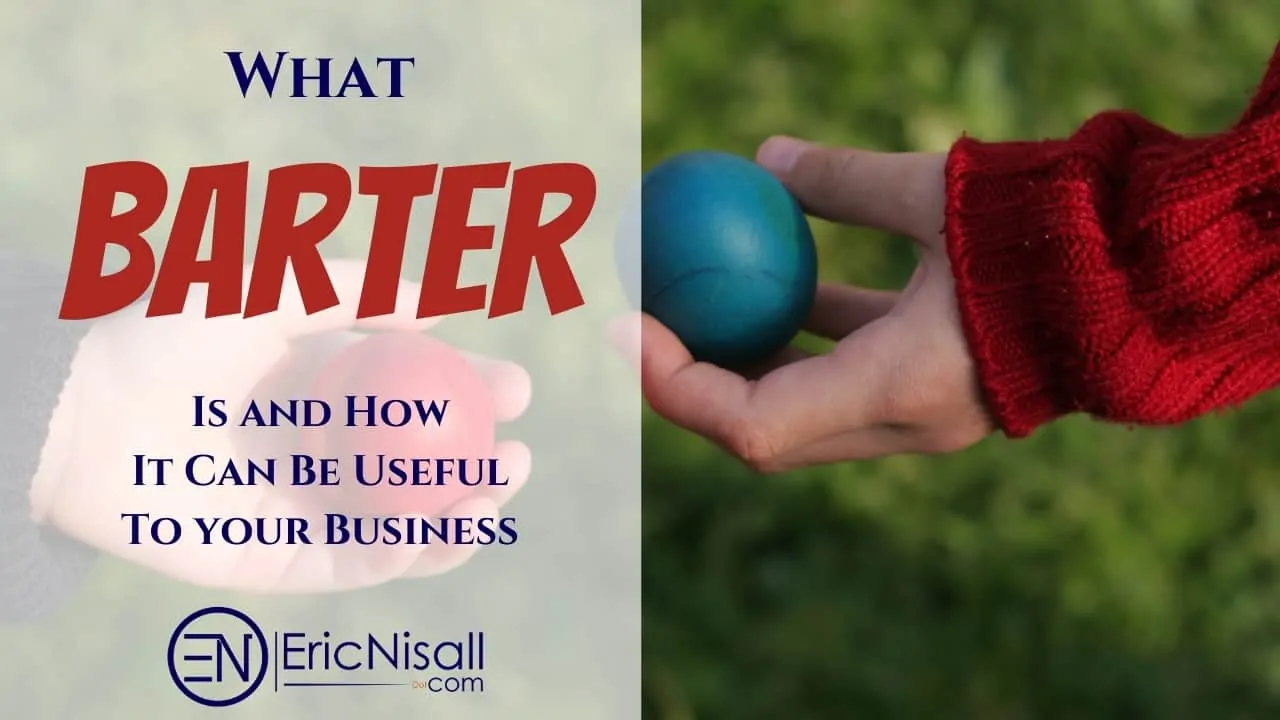What Barter Is & How It Can Be Useful To Your Business
This post may have affiliate links. Please read the Disclosure Policy for complete details.
Mesopotamia, 6,000 B.C.
That’s how far back the roots of barter go.
The fact the system is still used today is unbelievable!
Of course, it’s a little bit different now.
The premise, however, is essentially the same.
You give someone a product.
They give you something in return.
You do something for someone.
They do something for you in return.
Today the system can get much more complex.
But that’s what we’re covering right here–the ins and outs of bartering and how you can use it to help your modern business thrive!

What Is Barter?
Barter is simply trading with no cash involvement.
It can be goods, services, or any combination of the two.
Have a look at the exact definition:
barter
bar·ter | \ ˈbär-tər \
bartered; bartering; barters
intransitive verb
: to trade by exchanging one commodity for another : to trade goods or services in exchange for other goods or services
//farmers bartering for supplies with their crops
//bartered with the store’s owner
transitive verb
:to trade or exchange by or as if by bartering
//bartering work for foodMerriam Webster Dictionary
There is no set pattern or rule as to what can be traded for what, aside from those goods and services which are deemed illegal.
To promote it, and make it easier for people to interact, barter networks were established.
These systems enable trading to be taken to a new level by offering “barter credits” which are used like cash within that specific network.
We’ll look at how all of that works next.
Barter Networks

As mentioned earlier, there are barter networks that use their own “currency” to facilitate commerce.
For each transaction you make within the barter network, you would get “credits” which you can then bank and use at a later time on any other products or services.
These barter networks make trading more accessible as you wouldn’t have to find a partner directly, which will help expand your business.
You just need to get used to not using traditional financial institutions in these types of transactions.
For example:
You join a barter network to provide and purchase goods or services.
If you are a web designer, for example, you can design a site for an architect and get paid in barter credit.
You may not have any use for an architect’s services, but rather have a need for business cards.
You can then take your credits and hire a printer within the barter network to make your cards and pay them with the credits you earned from doing work for the architect.
Or, you can just keep those credits in your account until the time comes when you need something from anyone else within the barter network.
In the traditional barter system, you would be forced to search for a trade partner who has what you need and needs what you provide.
This method is easier than direct trade since you can acquire new customers who might not have anything you need in return.
These networks generally charge a monthly fee, plus commissions per transaction to support the network.
Companies like Itex, a publicly-traded barter network, use those fees to support their communities by hosting websites that provide classified ads, member directories and profiles, account information, and other benefits that vary based on the different networks.
Plus with barter networks, worrying about collecting receivables is greatly reduced as many of the networks give you online transaction-processing built-in.
As far as bookkeeping goes, you record your transactions the same way you would cash transactions, except with a different account for your credits as opposed to a regular cash account.
Unfortunately, I wouldn’t recommend a basic program like QuickBooks Self-Employed for your bookkeeping needs as you can’t track your barter accounts separately.
There really should be no learning curve–or just a small one–and you can essentially hit the ground running.
How You Can Benefit From Bartering
There are a number of reasons you may want to consider getting into bartering:
- Due to the fact that there is no cash involvement, practically any business can participate in a trade. This is especially helpful to a small and/or new small business where cash flow tends to be a big concern.
- Any combination of things can be traded: accounting services for web design; printing services for cleaning services or repairs; advertising for legal services. There is no limit to what you can trade for.
- The accounting and tax treatments are exactly the same as if you were using cash: all sales are taxable income and the same rules apply for deducting expenses (although the valuation is different which we’ll address a bit later).
- Without the need for access to large amounts of capital or credit, your business may be able to develop and grow more quickly.
- There are people in all sorts of businesses looking to trade a variety of goods and services, so your options are not limited.
- A way to reach a potentially untapped source of customers and generate word-of-mouth publicity that can spread to cash customers in the future.
- Trades may lead to future cash transactions or may be used to entice customers into cash transactions.
- You would conserve your cash for use on expansion such as hiring employees or use on expenses that cannot be traded for such as utility bills, business licenses, and self-employment taxes.
- It provides a way to sell off excess or slow-moving inventory when traditional marketing/sales methods have failed
- Some companies even use barter systems & credits to run payroll (don’t ask how employees want it, but I’ve seen it before!)
I’m sure other people can add to this list, but this is just what my experience has been.
Drawbacks Of Barter

Just like with anything in life, it’s not all positive with the barter system.
Unfortunately, there are drawbacks as well.
One of the biggest issues I ran into was the fact that I had little need for other people’s services or goods.
My business is pretty streamlined since I work out of my home and I’m 99.9% paperless.
That means I don’t need to trade for rent or office supplies or any other general office-related stuff.
I also have people that I use and trust for the services I actually do need so I already outsource business tasks like website maintenance or graphic design that are above my pay grade which eliminated those things.
So what happens when you have a bunch of “money” in your trade account and you can’t find someone to use it on?
I can tell you firsthand what happens:
YOU LOSE IT!
And it sucks, but I got lucky that I only dabbled so it wasn’t a huge loss.
Obviously, if you’re doing straight trades and not going through a network, then you aren’t going to “lose” anything, you’ll simply have a hard time finding trading partners.
If you are on a network, you have to pay a cash monthly fee as well as a percentage of your transactions.
For some people that may be a bit too much, particularly if you aren’t active and keep losing that cash each month for essentially no return.
Bartering And Income Taxes

As always, when the topic turns to your taxes please, please, please check with a qualified tax accountant!
Bartering is no different than any other manner of accepting revenue.
You still are required to include any “income” you make via bartering with your reportable income.
When using a network, that’s really easy because each “trade dollar” is the equivalent of a US dollar which makes tracking easy.
You even get the benefit of deducting the costs of doing business such as the network dues and fees they take out as well as the cost you incur in the normal operation of your business.
When you trade outside of a network, one-for-one (or group trades), it becomes a little more difficult–but not impossible.
Just because you are “trading” that doesn’t mean:
- You don’t have to report your income, and
- It’s always an equal value
You always have to report income, even non-cash.
And you may also have to be paying self-employment tax each quarter.
But for straight barter trades it’s…well… backward.
You see, you have to report the value of the services you receive as your income:
Bartering is an exchange of property or services. You must include in your income, at the time received, the FMV of property or services you receive in bartering.
IRS Publication 525 – Taxable & Nontaxable Income
The reason why you report the value of the other good/service is because your income is based on what you receive in exchange for it.
Generally, that comes in the form of money–so when bartering, you replace the dollars with the value of the good or service received.
Now, let’s assume the client is an attorney, and instead of money, they represent you in a case about a breach of contract. The total value of the representation ends up being $5,000 worth of time. In this case, you would recognize $5,000 as income since that is what you received in exchange for your services.
Let’s say you are a photographer. You receive $1,000 to shoot a wedding. Because you received $1,000 in return for your service you report $1,000 as income.
You simply replace the cash consideration with the value of the good or service you receive to determine the amount of income you must recognize from bartering.
This is something that a lot of people who write on the topic DO NOT KNOW OR FAIL TO EXPLAIN.
That can cause serious issues if you get looked at at some point in the future!
Wrapping Up
Now you know a bit more about the world of barter –and probably a lot more than most of what can be found online will tell you!
What you do with that info is totally up to you.
If you think you use it to add yet another way to sell your goods/services, great!
If you think it’s a good way for you to get goods/services while you use your cash to reinvest in your business, awesome!
Even if you decide not to get involved, at least you can now make that decision based on complete information!
To help you keep track of not just your barter accounts, but all of your business transactions, get yourself a subscription to QuickBooks Online. You’ll be able to track everything that comes in and out of your business and will make it so much easier to figure your quarterly estimates–don’t worry, the best payroll companies like Gusto sync with it too if you have an S-Corp– and year-end taxes.
Your Turn
So, is bartering for you? Have you ever tried bartering before? If you have will you use it again? If not, is there a specific reason you haven’t considered it?


I am currently starting a small business with Bartering being part of it and I read your amazing article but cannot wrap my head around how you do the credits, this is a great idea and I believe this will help allot in getting more users but I am stuck.